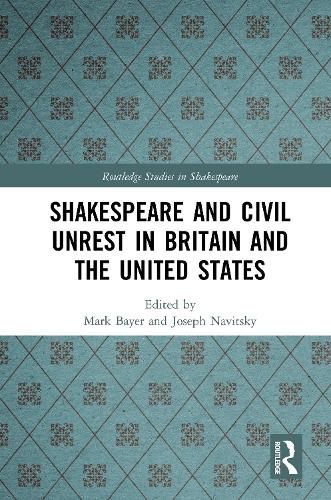Readings Newsletter
Become a Readings Member to make your shopping experience even easier.
Sign in or sign up for free!
You’re not far away from qualifying for FREE standard shipping within Australia
You’ve qualified for FREE standard shipping within Australia
The cart is loading…






Shakespeare and Civil Unrest in Britain and the United States extends the growing body of scholarship on Shakespeare’s appropriation by examining how the plays have been invoked during periods of extreme social, political, and racial turmoil. How do the ways that Shakespeare is adapted, studied, and discussed during periods of civil conflict differ from wars between nations? And how have these conflicts, in turn, affected how Shakespeare has been understood in these two countries that, more than any others, continue to be deeply shaped by Shakespeare’s complex, enduring, and multivalent legacy? The essays in this volume collectively disclose a fascinating genealogy of how Shakespeare became a dynamic presence in factional discourse and explore the war of words that has accompanied civil wars and other instances of domestic disturbance. Whether as part of violent confrontations, mutinies, rebellions, or within the universal struggle for civil rights, Shakespeare’s repeated appearance during such turbulent moments is more than mere historical coincidence. Rather, its inflections on the contested meanings of citizenship, community, and political legitimacy demonstrate the generative influence of the plays on our understanding of internecine strife in both countries.
$9.00 standard shipping within Australia
FREE standard shipping within Australia for orders over $100.00
Express & International shipping calculated at checkout
Shakespeare and Civil Unrest in Britain and the United States extends the growing body of scholarship on Shakespeare’s appropriation by examining how the plays have been invoked during periods of extreme social, political, and racial turmoil. How do the ways that Shakespeare is adapted, studied, and discussed during periods of civil conflict differ from wars between nations? And how have these conflicts, in turn, affected how Shakespeare has been understood in these two countries that, more than any others, continue to be deeply shaped by Shakespeare’s complex, enduring, and multivalent legacy? The essays in this volume collectively disclose a fascinating genealogy of how Shakespeare became a dynamic presence in factional discourse and explore the war of words that has accompanied civil wars and other instances of domestic disturbance. Whether as part of violent confrontations, mutinies, rebellions, or within the universal struggle for civil rights, Shakespeare’s repeated appearance during such turbulent moments is more than mere historical coincidence. Rather, its inflections on the contested meanings of citizenship, community, and political legitimacy demonstrate the generative influence of the plays on our understanding of internecine strife in both countries.